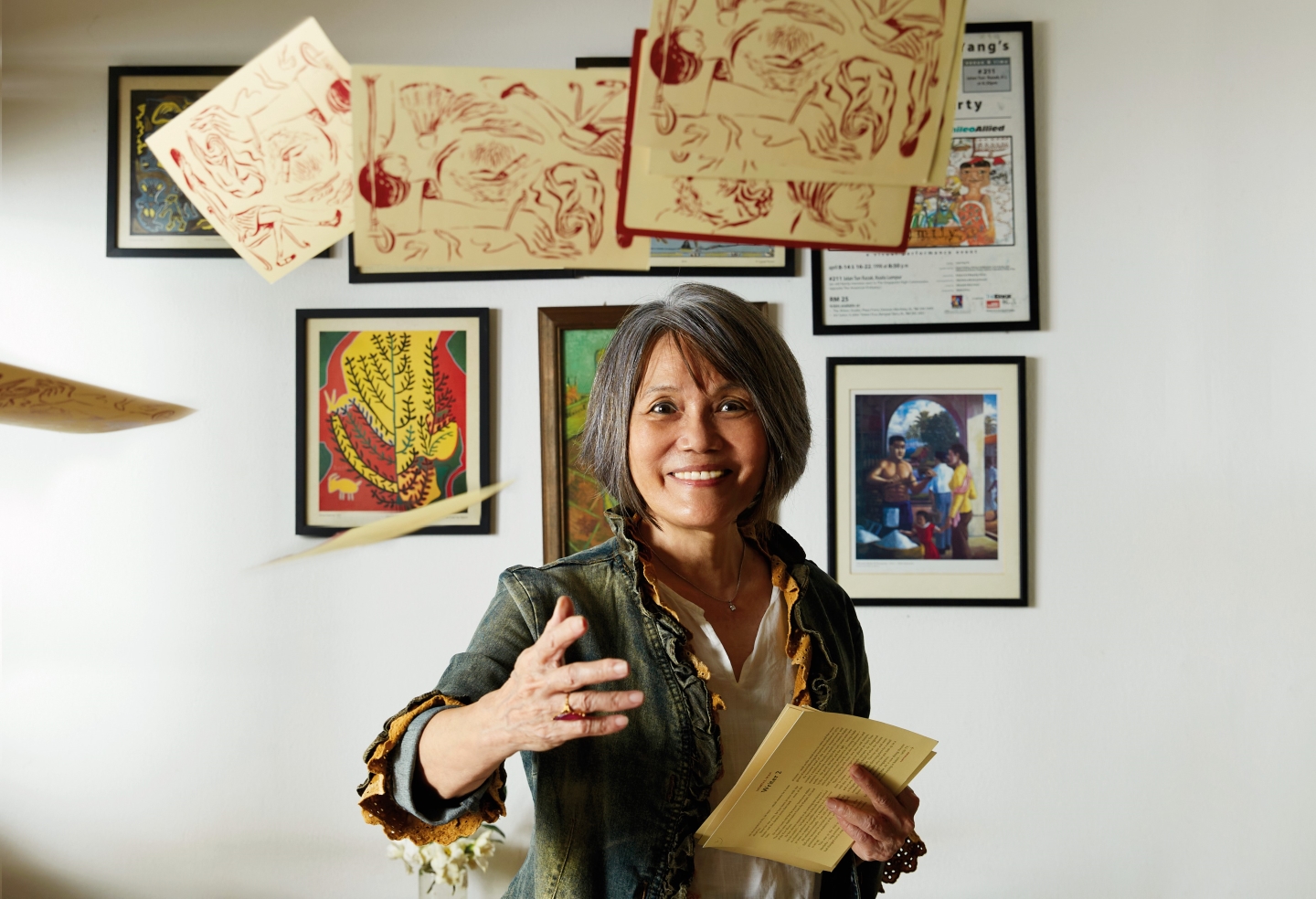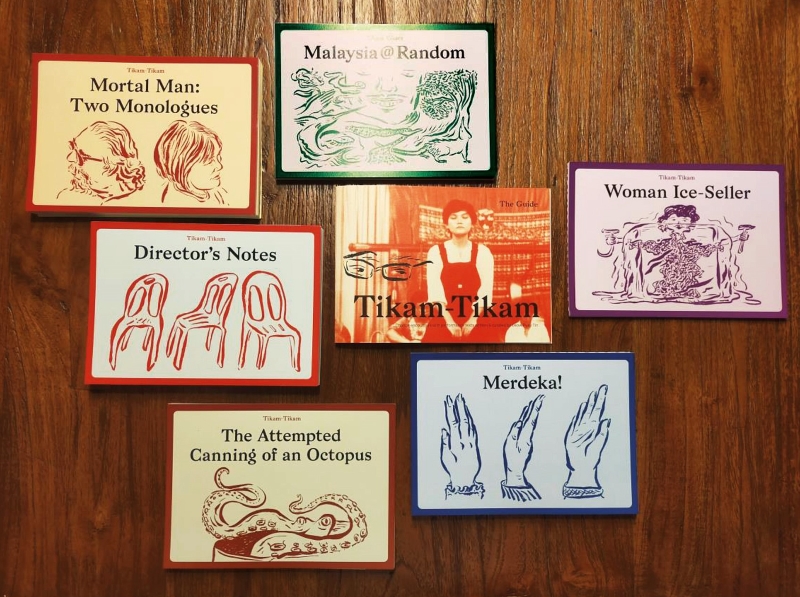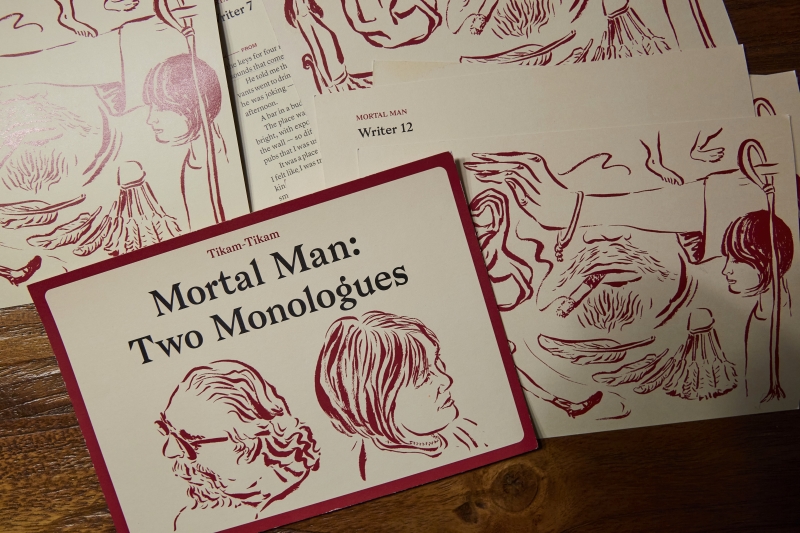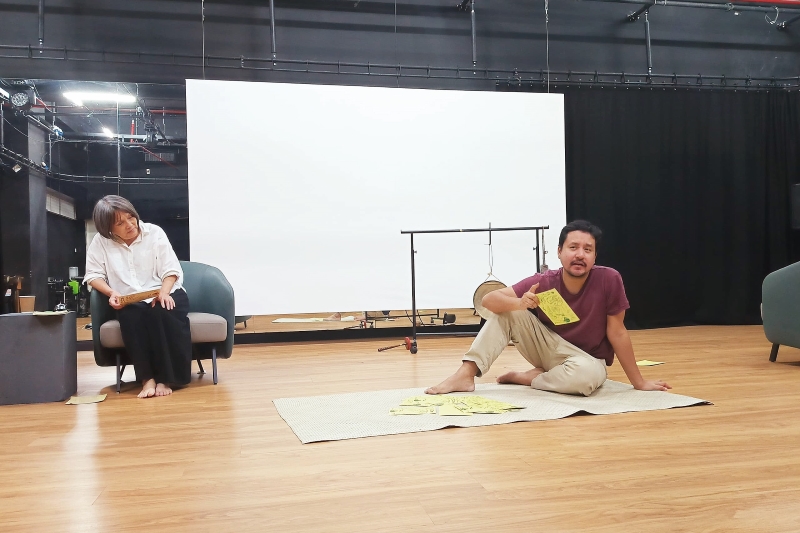
Leow: Theatre shows you things you may be thinking about but are not able to articulate. It asks the audience to empathise, to enter the world of the characters and see how they deal with certain things (Photo: SooPhye)
Leow Puay Tin has written two kinds of texts over the years: linear and “tikam” — shuffle the scenes, take some cards out and perform them in a different model. “Every time, no matter how you do them, you always come up with a meaningful [show],” says the playwright and actress known for work that delights, yet provokes.
Tikam-tikam, or “random pick” in Malay, was a game popular in her childhood: For a few sen, children would select a numbered ticket at the sundry shop and win small prizes such as tidbits or a toy. The term captures what she does in theatre: write, devise and curate texts that combine performance with chance.
Mortal Man: Two Monologues is one such attempt by Leow to play with text. In the show, which opens in Kuala Lumpur on Dec 12, she returns to the stage as a writer who remembers and recreates a conversation she had with a friend in a Singapore hotel room two decades ago. Performer and musician Faiq Syazwan Kuhiri portrays the latter, a famous director.
The accounts of both the unnamed characters, told in monologue, overlap as they think back on their early years, influences, formal education and the socio-cultural environment that shaped their artistic practices. “It’s been 20 years — and I am now older than he was when he told me those stories. [They] have moved and troubled me all this time,” the writer discloses.
Leow elaborates on that: “Theatre shows you things you may be thinking about but are not able to articulate. It asks the audience to empathise, to enter the world of the characters and see how they deal with certain things. Its job is not to provide solutions or answers, but we have the skills to put the issue across in a way that can be accepted.”
In conjunction with the Mortal Man run, producer Five Arts Centre will launch the limited-edition publication Tikam-Tikam: Chance encounters with performance texts written and curated by Leow Puay Tin, which invites fans of Malaysian writing to read, play and perform a collection of stories together. This volume compiles six works: The Attempted Canning of an Octopus; Woman Ice-Seller; Director’s Notes; Malaysia@Random; Mortal Man: Two Monologues; and Merdeka!
These are not recent works; all the texts have been performed, Leow says. “Some I wrote (Octopus and Ice-seller). In others, I was the curator going in to find writers and stories and creating the text. I took the materials randomly; it’s very rich because they come from different sources and various times. The idea is: This is Malaysian writing; so, let’s celebrate.”
tikam-tikam_press_kit-1.jpg

Malaysia@Random, for example, has works by poets Ee Tiang Hong and Shirley Lim and the late actor, director and playwright Jit Murad. There are parts from the Hikayat Abdullah, a Malay literary text; something about the Constitution by the late Lord President Tun Mohamed Suffian Hashim; and even articles from the early 2000s by journalists such as Jason Tan and Eddin Khoo.
Merdeka! presents reflections by three public intellectuals — Mavis Puthucheary, Azmi Sharom and Tricia Yeoh — who trace the political history of the country for a more factual understanding of what happened and why.
Director’s Notes has pieces the late director, theatre critic and educator Krishen Jit wrote in programme notes and things he said to actors during rehearsals, which have been turned into little dialogues that can be performed, Leow explains.
Octopus was inspired by a professor who questioned participants in a creative workshop, where he talked about doing research and being a responsible artist. “He said a lot of important things that I thought should be disseminated to a wider audience. But some of our projects are so huge and we have only an hour or more. It’s like you’re trying to put this big octopus into a can. So, do you want to kill it?” That question quickly prompts another: How do you learn to control your art?
Ice-Seller is a poignant short play centred on a woman, her husband and children, poor labourers who buy ice to keep the fish they sell fresh. They begin supplying it to others as well and business gets so good they open a shop and eventually drop the fish. “It’s about a woman telling her life story. Behind that is a bigger one about what makes the Chinese working class successful, those who start out with small, humble businesses. It’s hard work, good values, getting along with your customers.”
Leow’s performance texts, as written or in translation, have been staged by directors and theatre companies at home (among them Krishen and Chee Sek Thim of Five Arts Centre and Loh Kok Man of Pentas Project) and in Singapore (Ivan Heng of WildRice and Ong Keng Ken of TheatreWorks), Australia, Germany, Japan and the US.
Those who caught her first written play, Three Children, the original version done in 1984 or thereabouts, she thinks — based on her formative years growing up on Kappan Road in Melaka — will remember the questions that prick about displacement and identity as three Chinese immigrants to the country recall stories told to them and their own memories of growing up in post-colonial Malaysia.
In another early work, A Modern Woman Called Ang Tau Mui, a toilet cleaner who loves shopping, dreaming and Hong Kong star Lin Dai goes shopping on the day she dies. As she travels through time, this modern woman talks about who she sees herself as and what she longs for, in a moving show that combines text, movement, sound and music.
_s1a1996.jpg

Mortal Man was tested out two years ago through a public reading by Leow and Faiq. Theatre director and performer Tung Jit Yang came in to help find the frame for the text. She has since revised it expansively to almost a new work, and Ken Takiguchi is the dramaturg, giving her feedback as she developed the script. “As I was writing it, I was also editing the other texts across two decades.”
Initially, it was a conventional linear play with a beginning, middle and end, and two characters. That did not work, she realised, and it was redone as two separate voices. Now, each has their own monologue and Faiq, whom she taught in her performing arts class, has developed into a full-fledged performer in his own right.
“He’s very thoughtful as an actor; he has the depth, the gravity to tackle a heavy-weight character. His presence is very strong. He may be much younger than the character he’s playing, but that’s not an issue,” she says.
Basically, the famous director is recounting his young days, growing up in KL among railway workers, going to school, playing with friends and being a youth in the city. “They are very personal stories and there’s a reality to this character, who uses only some events to talk about his life,” Leow says.
The female writer discusses her work and theatre, and working with the Indian director. Her monologue somewhat reflects Leow’s own life, although “I only took very small bits and pieces. So, it’s not autobiographical”.
Both actors are on stage at the same time, with the writer narrating her account in a linear way and the director performing tikam-tikam style. He might begin with himself in the university, and the next scene is of him at the railway yard in Sentul, before looping back to the campus. Leow says: “Stories can happen in a very complicated and complex way. I’m trying to capture how life happens to people in a very randomised manner.”
She was not pleased with the initial Mortal Man text, hence her attempt to find another way to approach the tale. “I don’t know whether I’ve got it or not. I’m still trying. I think it’s an improvement from the first draft, but will this be my final? I don’t know. I’m known to be a chronic reviser.”
When reworking texts, she looks for inconsistency; if some things no longer make sense, they are removed. Some parts may need to be updated: “Usually, you find some problems with it only when you perform. So, it was my chance to revise, like a last call. Now they are ready to be read by anyone and enjoyed, and performed.”
Tikam-Tikam did not come about suddenly. She has been collecting her thoughts for years and some things have been published in the form of cards, but not as an unbound book with six sets of cards.
img-20241203-wa0007.jpg

“Before this, I didn’t know how to publish texts that are not meant to be linear. Now, with the publication, you can go in sequence if you want, but also take the cards and then put them into a different model.”
In the last five years, Leow has written several new plays — among them The Carer’s Monologue & Chorus, Oppy & Professor Communitas, and Material Woman in a Beauty World — and initiated collaborations with younger casts to stage them as productions and rehearsed readings.
As for why she is back on stage for Mortal Man, she says: “I just feel very strongly that I want to have the first go with it, kind of like [returning] to my earlier place, where I was the first performer. Now that the book is out, I want to share it. If any contemporary actors want to do it, they can write to me or Five Arts. I hope people will take up the offer.”
Having said that, she herself has not been performing as often as before. “You know, acting is quite fraught. I used to be so crazy about it. When I was young, like anything, just give it to me, I’ll act. But, over the years, I find that actually I enjoy writing, which has its own difficulties.
“Writing is less physically strenuous and demanding, in comparison. But, for Mortal Man, the subject has been so close to my heart and I’ve been trying to write it for so long. I was thinking, ‘I’ve got this story for a really long time. What do I do with it?’”
Leow, who is also an associate professor at Sunway University’s Department of Film and Performing Arts, has received grants from the Asia Centre of Japan Foundation and the East-West Centre in the US, and the UK Chevening Award.
Her love for theatre was seeded by the Chinese opera performances that awed her as a child in her home state. The first play she acted in was To Hatch a Swan, a student production at University of Malaya. In the futuristic work by Singapore playwright Stella Kon, she was a hugely pregnant human incubator with a cushion stuffed into her costume.
Leow’s work is fun and funny, but there is always serious intent behind them. “I wrote Mortal Man to explore race. Comedians make fun of the issue but stand-up comedy is not my forte, so I use theatre: How do I talk about it in a responsible and productive way?
“The point for me is to have a discussion to understand how race is dealt with, what kind of problems it presents, and how we need to think about it. In fact, we need to talk more about race in a way that doesn’t get people angry or frightened, in a calm and more productive way.”
Mortal Man does not have one ongoing narrative but there is “this crisis of little stories from all over, from across time and space, things that happen to people. I had to find a way that is pleasurable and entertaining but also insightful, and talk about race in a way that is productive, constructive and which, I think, can lead to more understanding at home”.
She sees race and religion as very separate things. Unfortunately, there are those who combine both in the country. “That’s where the problem starts. Race is just a distraction. If you can put it aside, we will see more problems that have nothing to do with it. We look at, you know, character, morality, ignorance, poverty of ideas. There are so many things that need to be addressed.
“We need to think and talk more about the things that bother us a lot. Religion is bothering us; so, of course, we have to find a way to talk about it. We cannot just get angry and make noise. No, no. We have to find a way to talk that’s comfortable for everyone.”
Having lived and worked abroad, Leow is optimistic about the country. “It’s liveable and beautiful. Here, we have a very good social network that is keeping us safe. We shouldn’t look to the state to solve all our problems. Why do we surrender our power when we can make some decisions for ourselves?”
Not naïve about simple solutions, she sees dialogue as being really about understanding, and theatre as a way to promote it. Responsible artists can put forward a play that will not chase audiences away but, instead, allow them to enter into the issue and listen to another angle or, hopefully, more than one. “The play can compact many angles into something. Theatre can be very powerful in that sense, in a soft way. Like the soft power of art.”
The hefty Tikam-Tikam will be on sale at the Mortal Man shows, at RM200 each. Who does she see picking up a copy? “Anybody who thinks there is value in reading, in literature. You can sit down with friends and a cup of tea and enjoy the stories. It is about sharing words and ideas. I think they need to be shared and celebrated.”
'Mortal Man: Two Monologues' runs from Dec 12 to 15 (8:30pm, 3pm) at Five Arts Centre, 9th floor, GMBB KL. Buy tickets here.
This article first appeared on Dec 9, 2024 in The Edge Malaysia.


